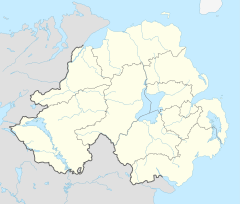Carnmoney
Carnmoney
|
|
|---|---|
| Carnmoney shown within Northern Ireland | |
| Population | 2,775 (2001 Census) |
| • Belfast | 6.3 miles (10.1 km) |
| District | |
| County | |
| Country | Northern Ireland |
| Sovereign state | United Kingdom |
| Post town | NEWTOWNABBEY |
| Postcode district | BT36 |
| Dialling code | 028 |
| EU Parliament | Northern Ireland |
| UK Parliament | |
| NI Assembly | |
Carnmoney (from Irish Carn Monaidh, meaning 'cairn of the bog') is the name of a townland (of 456 acres),electoral ward and a civil parish in County Antrim, Northern Ireland. Carnmoney is within the urban area called Newtownabbey and the wider Newtownabbey Borough. It lies 7 miles (11 km) from Belfast city centre in the historic barony of Belfast Lower.
Carnmoney is known throughout Belfast for its large graveyard. Carnmoney Cemetery sits on the slopes of Carnmoney Hill, a major landmark in the area, which also contains a woodland nature reserve. The poet Derek Mahon mentions Carnmoney Cemetery in his poem "My Wicked Uncle".
Carnmoney, as a settlement, grew up around a holy well (still visible in the current Church of Ireland grounds), Glas-na-bradan river and Carnmoney Hill. The area became a Norman borough known as Coole or Le Coule, the borough was wrecked several times during subsequent English/Irish/Scots battles and nothing is left. Le Coule was on the site of the present Rathfern/Rathcoole housing estates. Bits of the Old Irish Highway, an old route from Carrick to Antrim passing through the Norman borough, are still visible running alongside the current O'Neill Road. Carnmoney as a name has come to represent Carnmoney Village (the village previously known as Ballyduff).
Carnmoney Presbyterian Church is one of the oldest Presbyterian churches in Ireland as it dates from 1657. The plot where it stands was previously home to a meeting house, from 1622.
...
Wikipedia

